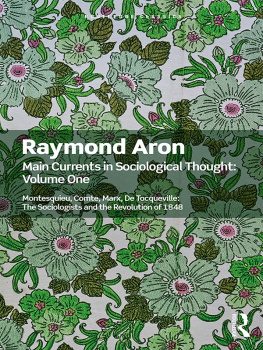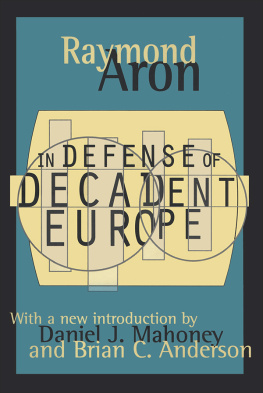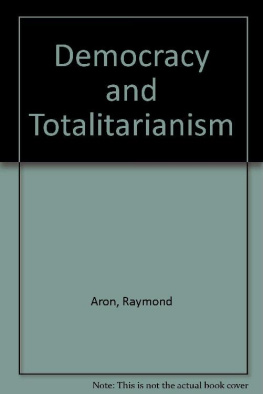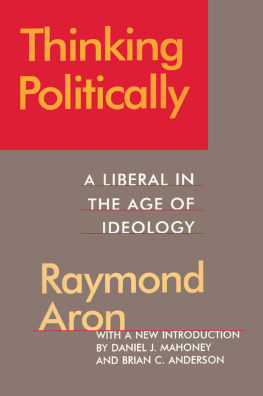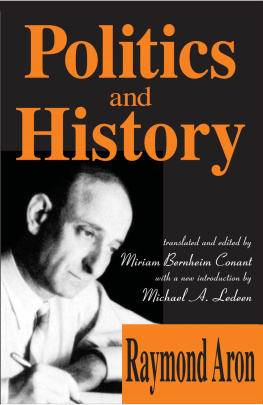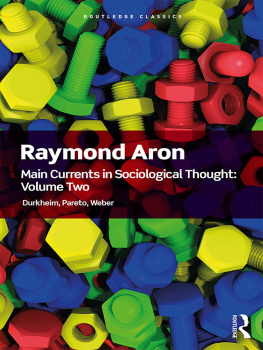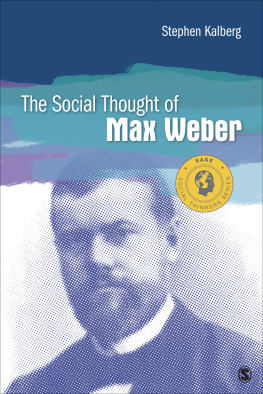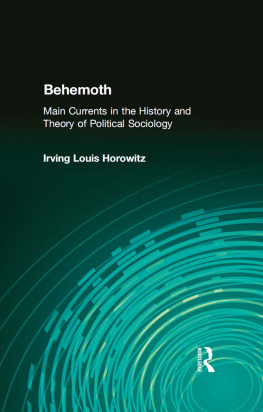Main Currents in Sociological Thought: Volume One
The lucid elegance of his thought and style and his ability to come to grips with the essential aspects of a thinker without being distracted by irrelevant detail combine to make this a most valuable contribution.
American Sociological Review
One of his great gifts as a teacher was to provide one both with the intellectual capacities with which one could then establish ones independence, and with the arguments one needed to preserve and promote the values one shared with him.
Stanley Hoffman, New York Review of Books
This is the first part of Raymond Arons landmark two-volume study of the sociological traditionarguably the definitive work of its kind. More than a work of reconstruction, Arons study is, at its deepest level, an engagement with the very question of modernity: how did the intellectual currents which emerged in the eighteenth century shape the modern political and philosophical order? With scrupulous fairness, Aron examines the thoughts and arguments of the major social thinkers to discern how they answered this question.
Volume One explores three traditions: the French liberal school of political sociology, represented by Montesquieu and Tocqueville; the Comtean tradition, anticipating Durkheim in its elevation of social unity and consensus; and the Marxists, who posited the struggle between classes and placed their faith in historical necessity. In his customary clear and penetrating prose, Aron argues that each of these schools offers its own theory of the diversity of societies and that each is inspired both by moral convictions and by scientific hypotheses.
This Routledge Classics edition includes an introduction by Daniel J. Mahoney and Brian C. Anderson.
Raymond Aron was the foremost political and social theorist of post-World War II France. Born in Paris in 1905 he studied at the Ecole Normale Superieur, where he met Jean-Paul Sartre, later to become a life-long friend and intellectual sparring partner. After the war he taught at the Sorbonne from 19551968, also maintaining a long commitment to journalism, first in Le Figaro then in LExpress. He was one of a handful of scholars to have two books appear on the Times Literary Supplements 100 Most Influential Books since World War II: The Opium of the Intellectuals (1955) and Memoirs (1983).
Routledge Classics contains the very best of Routledge publishing over the past century or so, books that have, by popular consent, become established as classics in their field. Drawing on a fantastic heritage of innovative writing published by Routledge and its associated imprints, this series makes available in attractive, affordable form some of the most important works of modern times.
For a complete list of titles visit www.routledge.com/classics
First published in Routledge Classics 2019
by Routledge
2 Park Square, Milton Park, Abingdon, Oxon, OX14 4RN
and by Routledge
711 Third Avenue, New York, NY 10017
Routledge is an imprint of the Taylor & Francis Group, an informa business
Translated by Richard Howard and Helen Weaver
Translation Routledge 1970
Introduction to the Routledge Classics edition 2019 Daniel J. Mahoney and Brian C. Anderson
All rights reserved. No part of this book may be reprinted or reproduced or utilized in any form or by any electronic, mechanical, or other means, now known or hereafter invented, including photocopying and recording, or in any information storage or retrieval system, without permission in writing from the publishers.
Trademark notice: Product or corporate names may be trademarks or registered trademarks, and are used only for identification and explanation without intent to infringe.
First edition published by Basic Books 1965; Doubleday 1968; and Transaction Publishers 1998
British Library Cataloguing-in-Publication Data
A catalogue record for this book is available from the British Library
Library of Congress Cataloging-in-Publication Data
A catalog record has been requested for this book
ISBN: 978-0-815-34812-2 (hbk)
ISBN: 978-0-815-34814-6 (pbk)
ISBN: 978-0-429-45245-1 (ebk)
When Raymond Aron died in November 1983, the left-wing newspaper Libration announced: France has lost its prof. This designation was even more significant coming as it did from a newspaper born in the events and spirit of May 1968, one which represented all that Aron had fought in the last part of his life. It is true that from November 1940 (when he began to write in London for the review La France Libre) to the time of his death at the age of 78 (he was still writing weekly columns for LExpress) Aron was Frances professor, in at least two ways. He was so as a journalist, regularly producing informed and judicious commentary on the domestic and foreign economic and political developments of the country; but he also was a professor in the proper sense, holding positions at the most prestigious institutions of higher learning. The book that the American reader has before him is a direct product of Arons courses at the Sorbonne.
Whoever has not had the pleasure of taking Arons courses or seminars does not know the extent to which academic discourse can be marked by clarity, gravity, and nobility. The writer of these lines is one of those who were initially attracted to Arons teaching by the charm of his voice.
Among the books that stemmed from Arons university teaching, Main Currents in Sociological Thought seems to me to be the most capacious and profound. The title, in French ( Les tapes de la pense sociologique; The Stages of Sociological Thought) as well as in English, only gives a faint idea of its content. The book is, in fact, a very rich reflection on modern society and on the condition of modern man.
Modern mans life is governed by two great ideas. In the domain of action it is governed by the idea of freedom, and in the domain of knowledge by the idea of science. Arons life and thought are situated between two extremes: on the one hand, that of a science of history and of society which attempts to abolish freedom (this was Marxisms destiny) and, on the other, a creative freedom which would reveal the hollowness of all so-called objective truth. Nietzsche and his innumerable epigones occupy this second pole. It is fair to say that Arons entire life and work were a battle against these two extremes.
The two volumes of Main Currents move between two authors with whom the problem of the relationship between science and freedom comes to the forefront. They formulate projects for establishing the greatest possible room for each of these goods. I am referring to Montesquieu and Max Weber (volume 1 of Main Currents opens with an interpretation of Montesquieu and volume 2 culminates in a treatment of the thought of Max Weber). The first, in the middle of the eighteenth century, was simultaneously the theoretician of modern libertywhich is founded on the progress of commerce and on the separation of powersand of a new social science which aimed to coordinate the various things which govern men (The Spirit of the Laws, 19, 4). This science would receive the name of sociology in the nineteenth century. The second figure, in the years leading up to the First World War, wanted to preserve both the principle of causality, which is the condition of all rational knowledge, and the sense of free and significant human action. This led him to conceive a sociology that aimed to do justice to the subjective viewpoint of the agent and to a politics that struggled against the impersonal bureaucratization of the world.

